Mar 24, 2019 | Brynn Weisholtz, Editorial, Opinion
By Brynn Weisholtz ’20
Standing in line to see Come From Away at the Schoenfeld Theater in New York City, I found myself wishing I were on a different line waiting for basically any other show. I peered around at the other shows near me. I saw Dear Evan Hansen and sighed; Kinky Boots and smiled; Hamilton and gasped. Indeed, I knew nothing about Come From Away except that my mother had met an older woman at Dear Evan Hansen who raved about it and convinced her to catapult Come From Away to the top of our Broadway wish list.
As the doors opened at 7:30, the line filed into the smallest theater I had ever been in. My family took our seats and, as I looked around, I noticed that the average age of the audience was somewhere between the ages of my parents and my grandparents. Suddenly, I heard a woman explaining that she and her husband had flown into New York City from Newfoundland this very morning to see the play. As the lights began to dim, my curiosity was piqued by her story; she had, in fact, lived through some of the events that were to be featured in the musical.
I knew Come From Away centered around the small town of Gander in Newfoundland, Canada, where an intimate community rallied to help strangers following the terrorist attacks of September 11, 2001. However, I did not have any concept of how the tragic events of the day forever changed the lives of the selfless people of Gander. With air traffic halted and planes unable to land in the United States, 38 planes were diverted to Gander Airport, and Gander, with a population of only 9,000, welcomed over 7,000 strangers from across the world with open arms. At a moment’s notice, cots were set up in schools, supplies were retrieved from local stores, food was prepared, and no questions were asked except, “What else can I do?”
I was truly in awe of all the people who opened their hearts and homes to complete strangers. The residents of Gander welcomed citizens from all walks of life and were not deterred by language or cultural barriers; instead, they bonded, embraced one another, celebrated life, and mourned the world’s tragedy alongside strangers, some of whom would become lifelong friends.Throughout the 100-minute musical, I was entranced by the story depicted on stage, one that brought both laughter and tears to my fellow onlookers and myself. While the majority of the audience appeared to vividly remember the events of 9/11, I only know of that day through second hand stories, as I was not yet born. Growing up in a post-9/11 world, I cannot fully comprehend how different life used to be, but the musical brought me to a better understanding of how radically the world around me has changed. Although I was not alive that fateful September morning, the tears I shed at the performance of Come From Away connected me with the people in that theater just as the people of Gander connected with their visitors. The show I regretted leaving my house for opened my eyes to see how selfless humans can truly be.
Mar 24, 2019 | Editorial, Opinion
By Ethan Malzberg ’19
I grew up with a life-size band-aid covering wounds it never healed.
Though the expanse of years has erased much from my memory, I’ve never forgotten any of the comments on my gay voice. The first was in fifth grade. I beat him in a game of War, to which he responded, “At least I don’t have a gay voice!” It was a word still foreign to me, only heard on commercials for Modern Family, but it has altered the way I view myself even to this day. In a term I learned from Dr. Rodney Glasgow at the Student Diversity Leadership Conference, it was cognitive dissonance — an “identity bump” — with one comment completely changing my own perception of my identity in a way I had never considered before.
I ran home to my mom that day, impatient to tell her what that boy said. After a brief pause, she delivered the normal parental recourse for when your kid is bullied: “You’re not gay, he’s just trying to insult you because he’s jealous. Don’t let him bring you down!” It was a relief to hear this from my mother at the time: I was not the unfamiliar word with which he described my voice because my mom said so. It was a little band-aid to shield an enormous insecurity that has stalked me since.
It was also a relief to hear my guidance counselor repeat the same sentiment the following day. “You’re not gay, he’s just trying to insult you because he’s jealous. Don’t let him bring you down!” It was the perfect recipe for repression; I could now ignore his comment for the foreseeable future because my mom and guidance counselor said so. That is, of course, until the next “your voice is gay” would come just two months later at camp. Although the band-aid’s effect was fleeting, it was just what I needed at the time.
Years later, I discovered an email chain between my mother and my guidance counselor about the incident. “[Redacted] called Ethan’s voice ‘gay’ today,” my mother explained to the guidance counselor. “Of course, Ethan is not gay, but he was very hurt,” she finished. As I observe that exchange today, I gawk at how the situation was handled. “You’re not gay”: not then, but now I am. “He’s just trying to insult you”: how is it an insult? “Don’t let him bring you down”: you just did! The truth is my voice is higher pitched than the average male. It always has been and it always will be; I recognize there is nothing wrong with this but my lasting insecurity tells me otherwise.
Instead of addressing reality, adults put a band-aid of denial over this wound. People commented on my voice throughout the entirety of my childhood — even the rabbi at my own Bar Mitzvah joked that it was “angelic” and “womanly” during his sermon, and the panacea has always been, “That’s not true! Your voice is normal.” Every time a band-aid was put on me, it was promptly ripped off, reapplied, ripped off, reapplied. An interminable cycle that all but begged the wound to fester.
I don’t blame my mom or my guidance counselor at all — or any adult for that matter, since the same situation arose more times than I can count and touched all areas of my being. Shifting societal attitudes over the past eight years have changed the conversation on how to raise LGBTQ+ kids and I believe that email exchange would have been very different today. Regardless, every adult who recoursed the bullying I endured had the best intentions to make me feel better.
This Band-Aid Culture extends much further than my situation. It reminds me of the trophy debate: should every kid on every team be awarded a trophy? We subliminally tell the youth that everyone is the best even if they aren’t. In principle, this guards children from an unwarranted inferiority complex. In reality, we raise children to believe that the sole point of a game is to win. We prescribe trophies as band-aids to the losers, telling them “you are not a loser” instead of “it’s okay to lose, there is a greater purpose to the game than winning.” Though not a perfect analogy to my situation, like trophies, adults slapped on a band-aid to my troubles, telling me “you are not gay” instead of “love yourself no matter who you are.” Using band-aids, we shield kids from pain at the expense of growth. The wound never heals; instead, it festers until it reaches its nadir, and eventually, it must be treated properly. We need to eliminate the band-aids and start handling issues at the onset.
Mar 24, 2019 | Editorial, Opinion
By Martha Lewand ’20
It may be hard to believe, but I recently had an interesting revelation when I took the ACT. Of course, most students consider the test both stressful and painful – it is a quintuple whammy of English, math, reading, science, and the essay. By the time I started to write that essay, I was thinking more about completing it than having a profound insight. But something about the essay got me thinking. Among other things, the prompt asked me to consider the perspective that we should block out as much bad news as we can, because too much negativity can lead people to believe that they can never solve the world’s problems. While that idea was initially appealing – after all, who wants to listen to bad news – I eventually concluded that bad news should be heard, not so we can wallow in depression and self-pity, but because hearing bad news is the first and most necessary step towards making the world a better place. As disturbing as bad news can be, it often is the impetus for positive change. Bad news may leave people frustrated, dispirited, and helpless, but when bad news inspires us to make a difference, it has the effect of bringing out the best in the human spirit, allowing us to find the solutions to the problems that plague us. To make ourselves better, we need bad news.
For example, take the Parkland school shooting in February 2018. In the aftermath, many people struggled to understand how such a thing could have happened. When I first heard about the incident, I was shocked, struggling to comprehend and grasp what had occurred. A few days later, however, I came across an article that detailed the biographies of the seventeen victims. As I scrolled down the list, tears began to stream down my face. I saw profiles that reminded me of students I knew and I also saw a profile that reminded me of myself. It described a seventeen-year-old boy named Nicholas Dworet. Nicholas was tall with blonde hair and blue eyes, like me; not only was Nicholas a swimmer, like me, but he was committed to swim at the University of Indianapolis next fall. Yet, he would never get to fulfill his dreams of attending college and pursuing the sport he loved.
Gradually, my sadness and heartbreak transformed into fiery frustration. I was tired of senseless gun violence in our schools; I was tired of hearing “thoughts and prayers” instead of demands for change. I had finally had enough.
Soon after, I heard about the March for Our Lives movement, the student-led demonstration that would take place in Washington D.C. I had never attended any sort of march before, but I knew this was a chance to use my voice along with hundreds of thousands of activists and demand change. On March 24, 2018, I woke up at 3:45 AM and made my way to our capital to march with my friend. We stood with our signs, marched on Pennsylvania Avenue with fellow students, and made our voices heard. I had never felt so empowered.
What came out of the Parkland shooting for me and many others was a newfound passion for political activism and the resolve to fight for better laws to prevent gun violence. I learned how important it is that young people stand up and fight for what we believe in. Finally, I understood that exposure to bad news is necessary because it can turn tragedy into something good, something that can inspire us to make change for the better.
Of course, no one wishes for bad news. That ACT essay perspective I mentioned made a good point: If we hear too much bad news, our hope for a brighter future may be crushed. In the face of catastrophe, we may just want to give up and stop trying. I felt that way after the Parkland shooting. However, out of our darkest fears and deepest despairs must come the resolve to make things better. To paraphrase, Edmund Burke once famously wrote that evil triumphs when good people stand by and do nothing. We have to be the force for positive social change. To become that force, we must confront the evil around us. When we learn of bad news, a school shooting, a race riot, or the murder of a journalist, we must resist the temptation to flip the channel or turn the page. As tough as it may be, we have to see the bad news as a chance to do something about it.
Recently, the US Congress banned bump stocks, which will keep someone from converting a legally purchased rifle into an automatic weapon. This will not end gun violence in America, but it is a critically important step toward making our schools, shopping malls, hospitals, and synagogues safer. That ban was passed because people were motivated by the grim reality of mass shootings in America. They accomplished this progress because they had the courage to confront a difficult truth and the conviction to act on their beliefs. We have to stare bad news in the face and work to make sure it doesn’t happen again. Only then will we build the country we want.
Mar 24, 2019 | Columns, Technology
By Aneesh Karuppur ’21
Welcome back to The Pingry Record’s Tech Column! There’s a lot to talk about this issue — namely the Consumer Electronics Show (CES) in Las Vegas, Nevada — but there’s still exciting stuff going on back home at Pingry, too.
First up, Pingry’s Student Technology Committee (STC) has made a lot of progress over the season. Pingry’s Apple Authorized Service Provider, called The Bear Repair, has fixed many students’ computers since it was started this fall. The Bear Repair has done everything from troubleshooting problems to running official diagnostic tests to performing display and battery replacements. It provides the same level of service as an Apple Genius Bar, but without the hassle of driving to a different place or making an appointment far in advance. STC’s Apple Certified Mac Technicians (ACMT) are fully qualified and follow official procedures, and The Bear Repair’s pricing is lower as well. Check it out in the back of the tech office. Consultations, troubleshooting, and problem diagnoses are completely free! More ACMTs are being trained as this article is being written, so there will be even more available technicians in the coming months.
STC’s Tech Team has undertaken an endeavor to provide charging carts around the school, so students don’t have to leave their laptop in the tech office or sit in the library if it needs to be charged. The Charging Station team is currently working on the logistics and the placement of these carts and hopes to roll them out as soon as possible.
Tech Team is also working on getting the most out of the school’s 3D printer. New members are being trained on how to use computer-aided design (CAD) to make and print models. All students are allowed to use the 3D printer provided they design the models themselves.
In global tech news, the Consumer Electronics Show (CES) was a big deal. Computers, specifically gaming laptops, made a big splash at the show. Many high-performance computers were released with Nvidia’s latest RTX line of graphics processing units (GPUs). Additionally, laptop maker Gigabyte released a laptop that uses artificial intelligence to optimize power delivery. All of these innovations, while very expensive and not completely practical yet, point towards a software-driven future.
Another big theme at the show was new smartphones. Many manufacturers showed off unique designs, including smart flip phones, and more notably foldable phones. These devices are important since they feature screens that can bend almost a full 360 degrees. This could potentially mean more screen size in the same form factor and could increase portability. Companies like Apple and Samsung have developed proprietary knowledge and techniques in this technology due to their promises.
Virtual reality is also becoming more important. HTC, which makes the Vive headset, demonstrated a new eye-tracking technology that allows you to look around a virtual space without moving your head. Oculus debuted the Quest, a new headset which provides a virtual reality experience without the hassle of hooking up a computer. In fact, Pingry has both HTC Vive and Oculus headsets, and a desktop to power them, so students will hopefully be able to use virtual reality technology in their classes in the coming years.
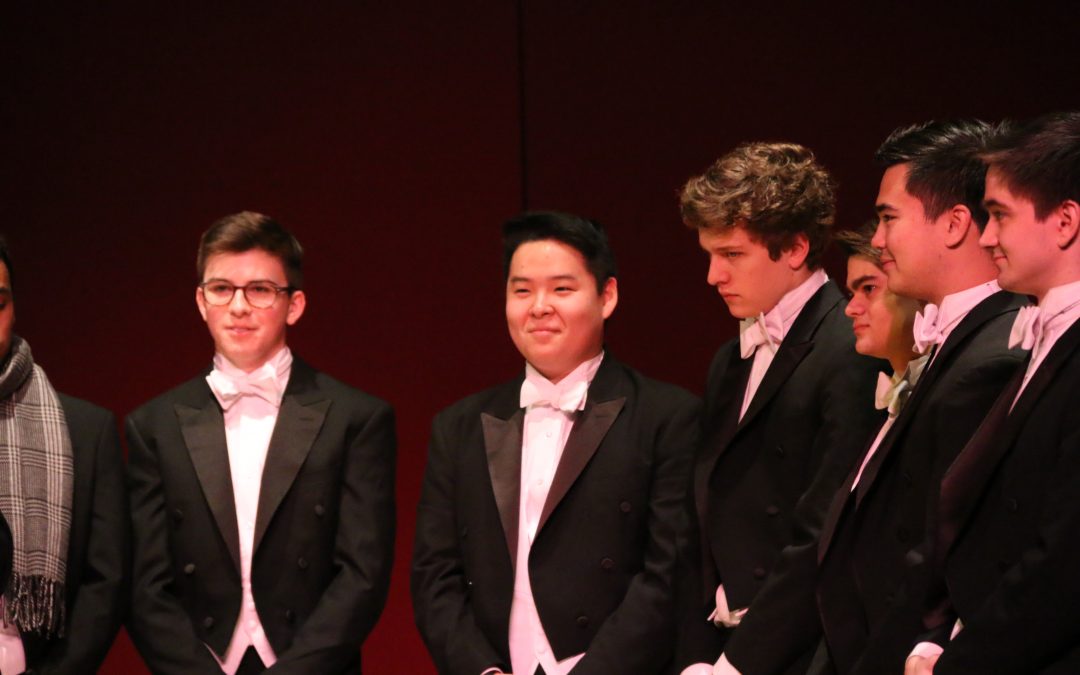
Mar 24, 2019 | School News
By Alex Kaplan ’21
On January 8, Pingry welcomed back TanTan Wang ‘16, who visited to perform with his collegiate a cappella group, the Spizzwinks. Wang is currently a member of Yale University’s Class of 2020. During his time at Pingry, he was an avid member of the school’s drama and music programs. Wang was a longtime member and president of the Buttondowns, participated in multiple Pingry productions, and received two Pingry Arts Awards in 2016 – the Outstanding A Capella Group Award and the Pingry Drama “Bottom” Award. The Spizzwinks returned to Pingry as a part of their hometown tour, which takes the group through the homes of each of its members. The East Coast leg of the hometown tour featured performances in Summit and Millburn; eventually the group opted to add Pingry as a stop to their tour. The performance included a capella renditions of popular songs, as well as spoken word skits performed by the members of the Spizzwinks.
The concert had an overwhelmingly positive response from the community. Dr. Andrew Moore shared his thoughts, saying, “The Spizzwinks were wonderful.” He commented on the technique and song choice of the group, adding that, “They draw on a long tradition of a cappella music mixing traditional and current popular songs in their repertoire,” and that, “The group has continued a high level of performance skill in both choral blend and solo singing.” Dr. Moore fondly recounted his time teaching Wang, saying that, “TanTan was a real cheerleader for the music program at Pingry. He was an outstanding Glee Club president, and was supportive of everyone in the performing arts in our community.”
Wang is one of many great examples of Pingry alumni involved in the arts. Dr. Moore expressed his appreciation for alumni like Wang, remarking, “I am so proud of all of our Pingry alumni who have gone on to sing in many of the great collegiate choral groups throughout the country.”

Mar 24, 2019 | Columns, Fashion
By Kristine Fu ’19
During this bleak winter season, comfort is the priority. Many girls are sporting cozy shearling jackets and teddy coats to stay warm. Though, despite the winter aesthetic of oversized sweaters and leggings, there are many exciting fashion trends on the rise at Pingry. What was once dismissed as kitschy and gaudy is making a comeback; animal prints have been spotted on skirts, turtlenecks, and even phone cases! Pair your favorite basic sweater with a leopard print skirt or finish a monochromatic outfit with faux snakeskin shoes. On a night out, wear a leopard print coat with heels for the “city-girl look.”
With the spring season only a few weeks away, it’s time to break out the Lilly Pulitzer dresses and pastel skirts, as this year’s spring trends are reminiscent of Sixties fashion. The counterculture of the 1960’s represented a rebellion against the values of traditional society. During this time of social upheaval, mainstream fashion was radically changed with the emergence of Bohemian fashion. The same trends of flared sleeves, fringe jackets, and flowy peasant dresses can be seen at today’s popular clothing stores, such as Free People and Forever 21. Embrace the Boho-chic style with floral print dresses and embroidered denim jackets. For a comfortable and stylish outfit, wear a pair of flowy and flared pants with a plain tee-shirt.
With the revival of Sixties Mod, you’ll be seeing lots of brightly-colored culottes and tweed tops this spring. If you’re looking for the essential mini dress, find one with a fun and flirty print, like polka dots or colored stripes. Though once regarded as a fashion faux pas, mixing prints is in vogue once again. So, don’t be afraid to experiment with the broad color palette. This was the era of bold, innovative, and creative fashion that broke all the rules and created new trends. English model, Twiggy, popularized the plaid mini skirt, which had initially shocked the public. Leopard print was born in the wardrobe of the first lady and Sixties fashion icon, Jackie Kennedy. Yves Saint Laurent’s knee-high boots demonstrated that fashion had both functional and aesthetic value.
As the Italian designer Elsa Schiaparelli once said, “In difficult times, fashion is always outrageous.” Whether it is mixing prints or trying a vintage trend, take a fashion risk this season to find your own style. The values of individuality and self-discovery were fundamental to the counterculture revolution.
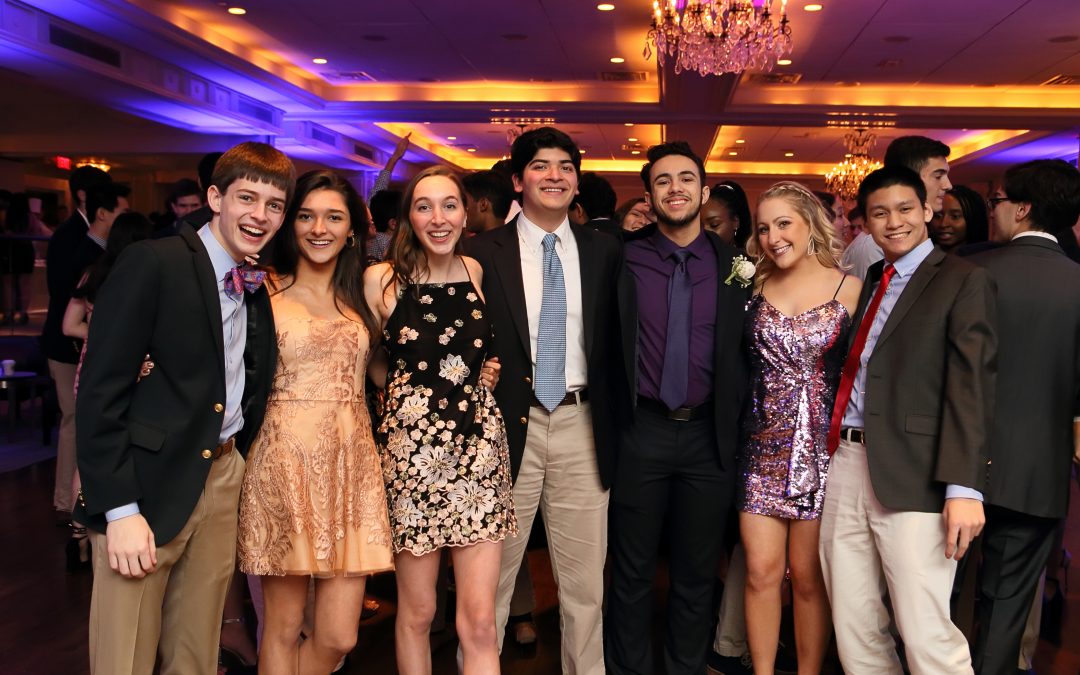
Mar 24, 2019 | Meghan Durkin, School News
By Meghan Durkin ’21
On Saturday, January 26, students arrived at The Westin Governor Morris in Morristown, NJ for Pingry’s annual winter dance, Snowball. Snowball is a “Sadie Hawkins”-style dance, in which girls traditionally ask boys to attend the dance with them. Students, dressed in formal attire, filled the hotel for a night of dancing, music, and friendship.
Last year, The Westin served as the location for Snowball for the first time. The venue turned out to be a terrific space, with a large dance floor, spacious lobby, and plenty of dining tables for students. Because it was so well-received by the community, Student Government decided to hold the dance at The Westin again. Upon arrival, students entered a main lobby where they could check their coats and bags. Up a flight of stairs, there was a buffet along with soft drinks and a dance floor.
The food choices were a highlight of the event, including macaroni and cheese, dumplings, and burgers. Student Body President Andrew Cowen (VI) agreed that “the food was great.” Along with the food, students could take pictures in the photo booth with props, while the event as a whole was photographed by Peter Chollick Photography. Helen Baeck-Hubloux (V) said, “I found the photo booth to be a very good experience for bonding.”
This year, music included both popular songs, like Cardi B’s “Bodak Yellow,” and old favorites, like “Come on Eileen” by Dexy’s Midnight Runners and Neil Diamond’s “Sweet Caroline”. Many students crowded the dance floor throughout the night, including Baeck-Hubloux, who added, “[I] had a wonderful time dancing with friends.”
Students agreed that Snowball served as a great opportunity to connect with classmates. Maile Winterbottom (IV) said that it is a “good time for the school to get together as a community and everyone to just bond over something super cool and fun and to get dressed up.”
Sydney Stovall (IV) said, “Snowball is a great time to get with friends and meet new people. You are all dressed up, so it’s a really fun atmosphere. Of course, it’s a good time to release some stress.” Snowball, once again, provided a time for the student body to come together with dancing, music, and food.
Mar 24, 2019 | School News
By Emma Drzala ’19
On February 22, six competitors sat on the Hauser stage waiting to present their speeches. Finalists Kaley Taylor (IV), Alexandra Weber (V), Carolyn Coyne (IV), Noah Bergam (IV), Jamie Wang (V), and Aneesh Karuppur (IV) qualified out of 20 other students in the preliminary round of the annual Lebow Oratorical Competition. Mr. Richard Karrat, the faculty advisor of Lebow for the last two years, said he loves working on this competition. He thinks, “Public speaking is an important skill to have. This competition allows for students to showcase their speaking skills as well as convey their thoughts and opinions to the school community.”
The assembly opened starting with Coyne. Her speech “Drink the Water” was centered around complaints. Coyne argued that we, as a community, are caught up on first world problems. Our complaints rarely dive beneath the surface. Coyne pointed out that about 2,000,000 per year people die of dehydration alone, and so, “Even if the glass is half empty, we should drink the water.”
Following was Weber. She began her speech, “The True Meaning of Music to my Ears,” by talking about the tragedies her family had gone through in the last year. A song that got her through her hard times was Led Zeppelin’s “Thank-You.” Weber opened up to the audience, telling them how music is a communicator and can change your life if you allow it to. She ended the speech by telling us to, “Find your song, and enjoy your ride.”
Bergam opened his speech by reminiscing on a day in a Starbucks cafe. In his speech “Chasing Memes,” Bergam questioned memes. He noted memes as a way around the complexity of life. He challenged the audience to not chase shallow behavior, and instead to find a deeper understanding of themselves. Bergam stated, “What intrigued me the most about the topic was both its scientific theory as well as its timeliness, in an Internet-driven world. I really enjoyed delving into this idea as it related to my own identity as well as the integrity of our communication at large.”
The next speech was “Be Open and be Aware” by Taylor. She told us about how, in the last year, she realized the limit of how sensitive the Pingry community can really be. Taylor confessed some of the personal happenings within her family and related the speech back to her original thought that we all need to be more open. Lastly, Taylor reminded us to connect with others on a deeper level and to get to know someone beyond their smile.
Wang’s “Barking Up the Wrong Tree” followed. She started the speech by telling the audience about a crush she once had. She went on to date him, but it didn’t work out. A year later, Wang went on to join the robotics team. She had the realization that she had no more free time and started wondering what she really loved. As the speech came to an end, she reminded the audience to find something that we really love and run with it.
The final speech was “The History of Pingry” from Karuppur. He said, “I drew my inspiration from a summer internship I did. I was inspired by the school and its development.” Karuppur showed us of some of Pingry’s flaws and myths to remind the community that the school has its own complex and dynamic history, despite how many view it ass monolithic and unchanging. He impressed that we are building a foundation for the future; we are making history.
At the end of the assembly, Taylor was chosen as runner-up and Bergam was named the winner.
Mar 24, 2019 | Editorial, Opinion
By Ketaki Tavan ’19
This past Friday’s LeBow Oratorical competition reminded me of what now feels like a distant high school memory: my 5-person, trimester-long Public Speaking class that I opted to take instead of Driver’s Ed. Every time I’m asked about my favorite class I’ve taken at Pingry or course recommendations from classmates, I unfailingly circle back to Public Speaking.
I initially gravitated towards the course due to an interest in improving my speech writing and delivery skills. We worked on these skills every day through observation, discussion, and practice. Class flowed freely and in accordance with what was happening around us — if there was a major speech at Pingry or in the wider world that week, we’d make it a point to discuss what worked and what didn’t, what we’d do differently and how we’d emulate the high points.
The practical speech writing and delivery skills (like cold-reading, for example) I took away from the course should not be overlooked — they’ve stuck with me to this day, and thanks to my experience with them I’ve pushed myself to give speeches to various circles in my community several times since the course ended. But personally, what made the course so special weren’t these takeaways that I anticipated when signing up, but rather the takeaways that I truly didn’t see coming.
Because of the nature of speech writing itself and the frequency with which we did it in the class, Public Speaking became a vehicle through which I was able to really process my ideas and feelings. I came out of the course having reflected on some of my own experiences and views on the world as well as some of the most effective ways to share them. I left with a portfolio full of these reflections that will not only inspire future pieces but also serve as a unique form of a diary documenting the ideas I grappled with throughout the course.
Not only did Public Speaking allow me to learn more about myself, but it also allowed me to learn more about my classmates. Because of the vulnerable and personal nature of speech writing, when I listened to the speeches my peers brought to class each day, I learned so much about their personalities, views, and how they contributed to a truly diverse Pingry community. Speeches often sparked political, social, and academic discussions where we learned about each of our viewpoints and, in terms of speech writing, how to strengthen them rhetorically. We learned to debate thoughtfully and intelligently with each other because it was the way we were taught to craft arguments through our speeches.
My class became a mini-community of friends who came in to each meeting excited to hear what the others had to share. We learned from each other and grew closer because of what each of us shared at the podium on any given day. This was a collaborative experience through which we took inspiration and were constantly offered advice by our peers. Each of my pieces became what felt like a group-effort from several people who really cared about the final product.
While Public Speaking may not catch most students’ eyes when searching for courses, I encourage my classmates to consider the hidden treasures that the class holds. An opportunity to learn skills that will universally serve you well in the future, as well as engage with the diversity of thought and personality within yourself and your community, Public Speaking truly is worth a trimester from each and every student.
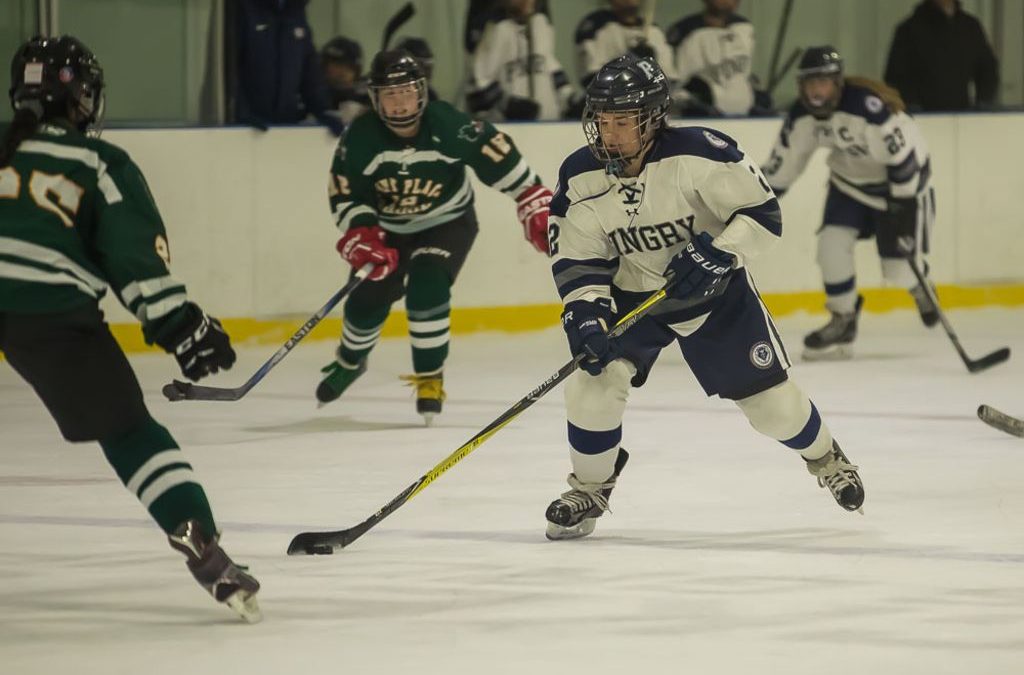
Mar 24, 2019 | Athletics, Eva Schiller
By Eva Schiller ’21
The girls’ ice hockey team, led by captains Clare Hall (VI) and Sophia Smith (VI), has powered through the season to finish with six wins and eleven losses. Despite having only thirteen members and facing large, competitive teams, the team has stayed resilient, and in the end, made it all the way to the MSU league semifinals. Although they unfortunately lost to Chatham-Madison, the team is new to the league, which makes their success in the tournament impressive nonetheless.
Perhaps more important than their record is their energy and how close they are as a team, both of which can be attributed to their relatively small size. “We’re always really supportive,” team member Anushka Agrawal states (IV). They are also very excited for success in the future. As Co-captain Clare Hall says, “Although the team was small this year and will be losing two seniors, we hope that many girls join next year and that the team has a successful season!”
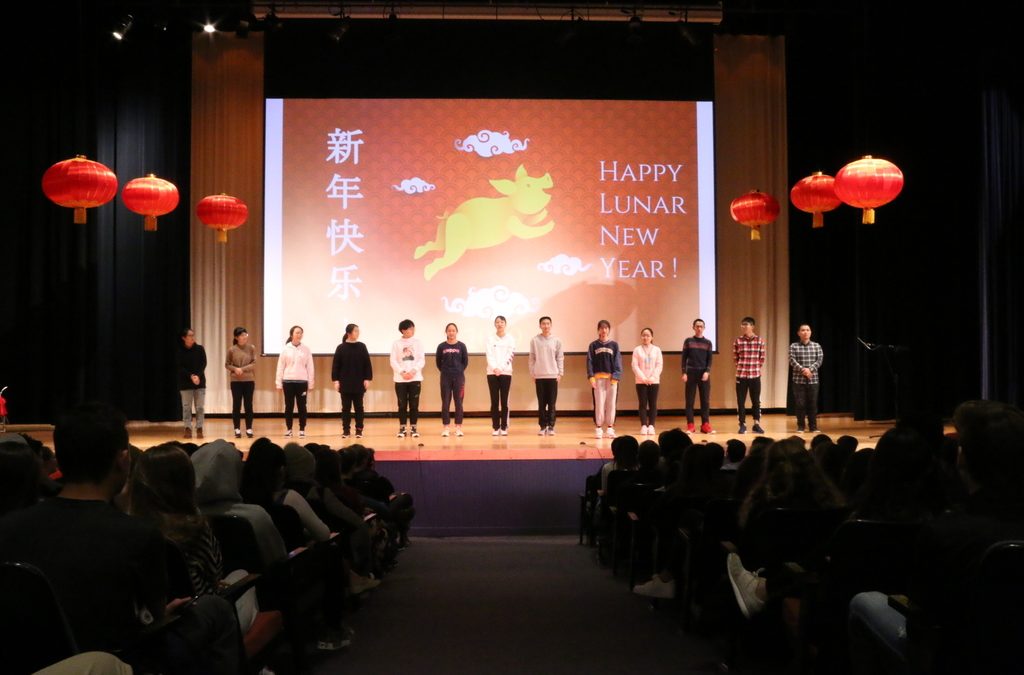
Mar 24, 2019 | Eva Schiller, School News
By Eva Schiller ’21
On the first day of Chinese New Year, Quzhou(衢州), China, was filled with warmth and gaiety. School and work went on break as people returned home to their families and celebrated the coming of the new year. But for twelve students from Quzhou Number 2 High School, the first day of Chinese New Year meant saying goodbye to their families and boarding a plane to the other side of the world.
On the evening of February 5th, these students landed in Newark, New Jersey and were welcomed by Ms. Yi Hao, Pingry Chinese teacher, and several Pingry host families. Over the next week, they explored foods, activities, and places that highlight American culture. On the Pingry campus, this included visiting the lower school, observing Chinese classes and speaking with the students, hiking to Pingry’s green campus features, and watching school sporting events. The twelve students and their English teacher even sang a beautiful medley of American and Chinese songs at the Lunar New Year assembly.
Outside of Pingry, the host families were tasked with planning their guest’s activities. These included, but were not limited to, shopping in New York City, skiing, visiting famous museums, and trying fro-yo and Chinese takeout. In fact, many of the students had a delicious taste of apple pie (an American classic!) during their stay. These activities were truly the highlights of the exchange, as the students got to “see the similarities and differences in American and Chinese teen culture,” according to Monica Chan (IV), one of the host students. By showing their guests how to eat toast (use your hands, not a fork), use Snapchat, and bowl, the hosts discovered the joy “of introducing someone to a new culture, and watching them grow as they try new things,” in the words of Guan Liang (IV).
Although the Chinese students are all studying English, the exchange also encouraged Pingry students to work on their Chinese skills and reach across language barriers to connect with their guests. Alex Strasser (VI) commented, “Hosting has been an amazing experience for me, and it has reinforced my desire to study Chinese language and culture in college.”
Although the Chinese students were only here for one week, they formed loving, lasting relationships with their host families. At the farewell dinner, each guest and host made an impromptu speech about their experiences, and how they would “remember it all, forever,” according to JiaYi, the guest of Eva Schiller (IV). Tears were shed by both hosts and guests during the event as they reminisced about the week and reminded one another to keep in touch. Many of the speeches also included a heartfelt thank-you to Ms. Hao and Mr. Jeff Jewett for their hard work and time spent planning.
After leaving Pingry, the students visited tourist spots in Washington D.C. and New York City, sending photos to their host families along the way. Monica Chan’s guest, Ming, described the exchange best: “Good food, good people, and I had a wonderful time!”
Mar 24, 2019 | Editorial, Opinion
By Rashida Mohammed ’19
The widely-known novel Huckleberry Finn by Mark Twain has recently been eliminated from Pingry’s American Literature curriculum. Additionally, Heart of Darkness by Joseph Conrad, which was on the book list for World Literature sent out this past summer, was not taught in any of the World Literature periods. This is following what seems to be a rising trend in the United States of removing books from English classrooms. Many complaints about the appropriateness of these texts or those similar often come from black parents (such was the case in The Duluth school district in Minnesota), black students (like those in Montgomery County, Pennsylvania), or the NAACP, which has labeled Huckleberry Finn’s use of the n-word over 200 times as offensive, a stance they’ve held since the 1950s.
In trying to understand these complaints, I thought perhaps that people felt uncomfortable with students reading what they considered to be a problematic piece of literature or were uncomfortable with students and teachers reading derogatory terms in a classroom setting. After some thought, I think that there is a common theme related to all these qualms about reading such books: the inability to embrace discomfort. This idea became better fleshed out after reading an interview with Jocelyn A. Chadwick, President of the National Council of Teachers of English, in which she said, “[Huckleberry Finn] goes where Americans really don’t want to go. We talk about race and racism and acceptance and inclusivity and equity…but we don’t really listen and engage in a real substantive conversation.”
In the past few years Pingry has seen progress on topics of race relations in the form of its affinity groups and Black Student Union. Between these groups and our many advisory meetings, SDLC-hosted events, and leadership trainings, several conversation norms have been impressed onto us as important skills in school and in life. One of these norms is to lean into discomfort. Regardless of why Pingry made the decision to alter the curriculum, I hope that leaning into discomfort doesn’t leave the English classrooms as a skill. I cannot emphasize enough that it is not okay to feel unsafe in a learning environment, but the ability to disagree with and analyze multiple perspectives, even if it’s one that you may find offensive, is vital. I hope every school that removes books like Huckleberry Finn from their curriculum considers this opinion.
Arguing that other works like The Secret Life of Bees and The Lord of the Flies could replace these novels and convey the same sentiment is valid, but we need to be careful with where we draw the line. Living in such a vocally polarized country, we are more grounded in this debate about race now more than ever. So, why not let the discussion start in the classroom?
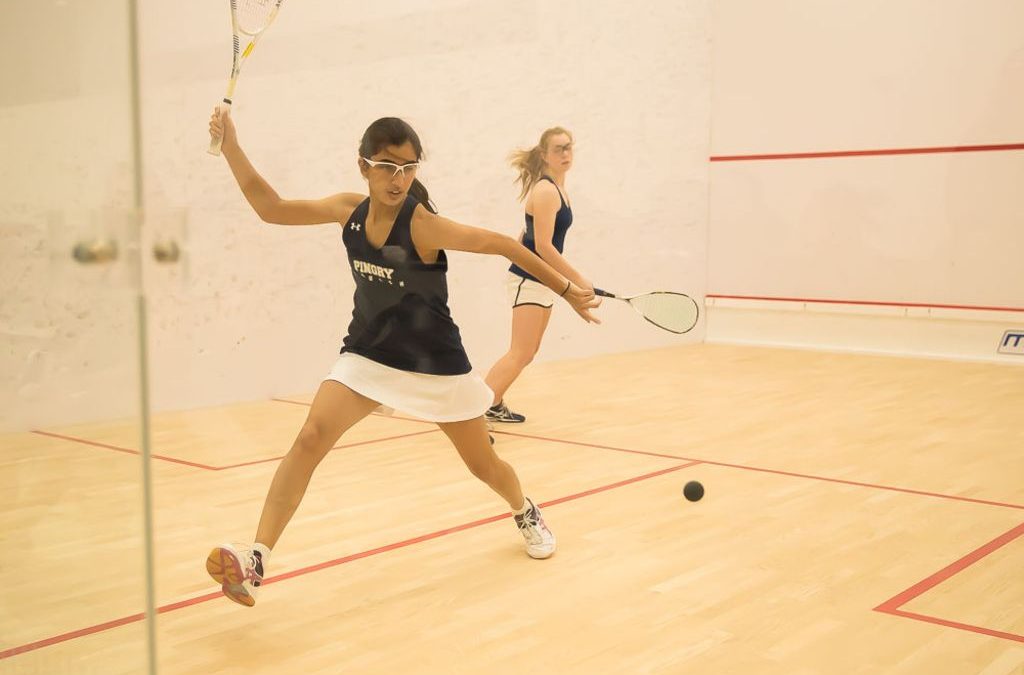
Mar 24, 2019 | Athletics
By Brian Li ’20
The girls’ squash team had a successful season with a final record of 6-6 and finished 16th at the U.S. Squash High School National Championships. Many of the team’s members also competed in the NJ High School Squash Championship on January 6th. Renee Chan (V) secured a victory for Pingry, Alisa Chokshi (VI) took second, and Olivia Hung (III) finished third.
Coaching a young team with lots of potential, Head Coach Tina Rix-Stout is excited to see how the team’s players develop and progress in the future. Although captains Chokshi and Aashiya Jaggi (VI) are graduating this year, the addition of four new freshmen on the team makes its future very promising.
Despite performing well over the season, the team recognized a few areas they need to improve in. In order to prepare for next season, Coach Rix said, “[As] a team, we need to work on our fitness and endurance. By doing this, the players will be more confident in their skills and able to withstand matches that are longer in duration and intensity.”
The team is excited to continue building a supportive culture and strong connections with each other. Coach Rix explained that “Everybody should put all their effort into the team to ensure we put our best foot forward at the start of the new season.”
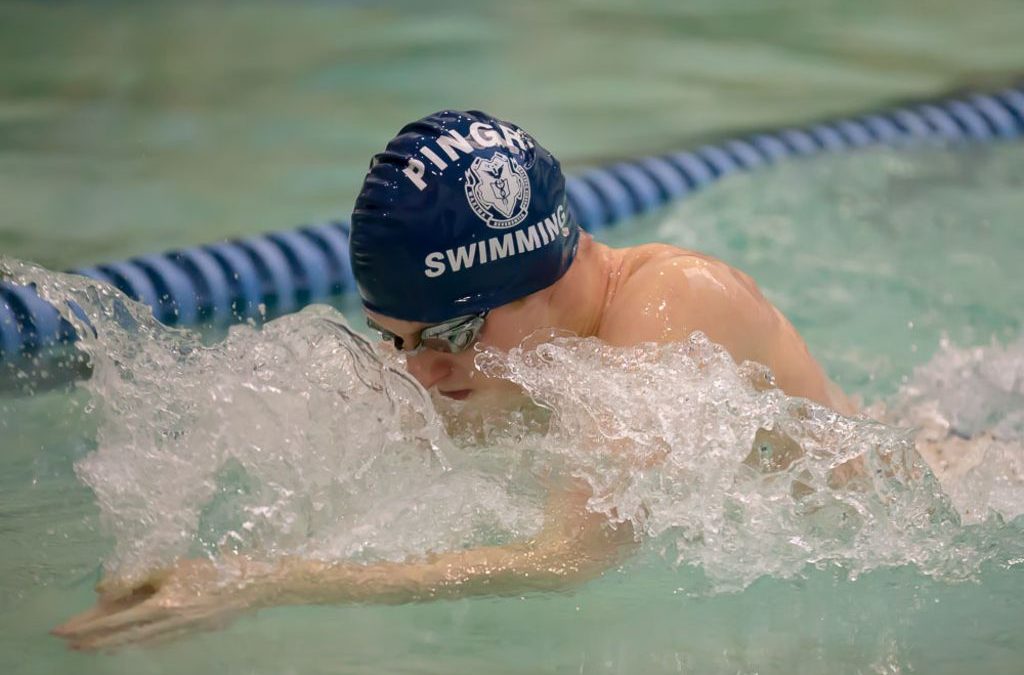
Mar 24, 2019 | Athletics
By Justin Li ’21
Pingry boys’ swimming has had yet another dominant season. Like last year, they’ve maintained an undefeated record, and, as senior captain Kevin Ma (VI) states, “Although we graduated an extremely strong senior class last year, we still managed to prove to everyone that we are the best team in the state.” The team’s commanding 109-61 win over Bridgewater, the next best team in the state, serves as evidence of their strength this year.
Their performance earned them a first place finish at the Skyland Conference Championship, where they claimed 17 top-six swims and placed first in every relay. They also won the Prep Championships against other strong teams, including Delbarton and Pennington. In addition to their success at meets, the team’s season was filled with record-breaking swims. Individually, Matt Fallon (IV) set both new school and pool records in the 200 meter IM, 200 yard IM, 400 meter freestyle, and 100 yard breastroke. Kevin Ma (VI) also broke the Skyland Conference record for the 50 yard free. As they head into the state tournament, they hope to continue their success and add yet another title to an already impressive season.
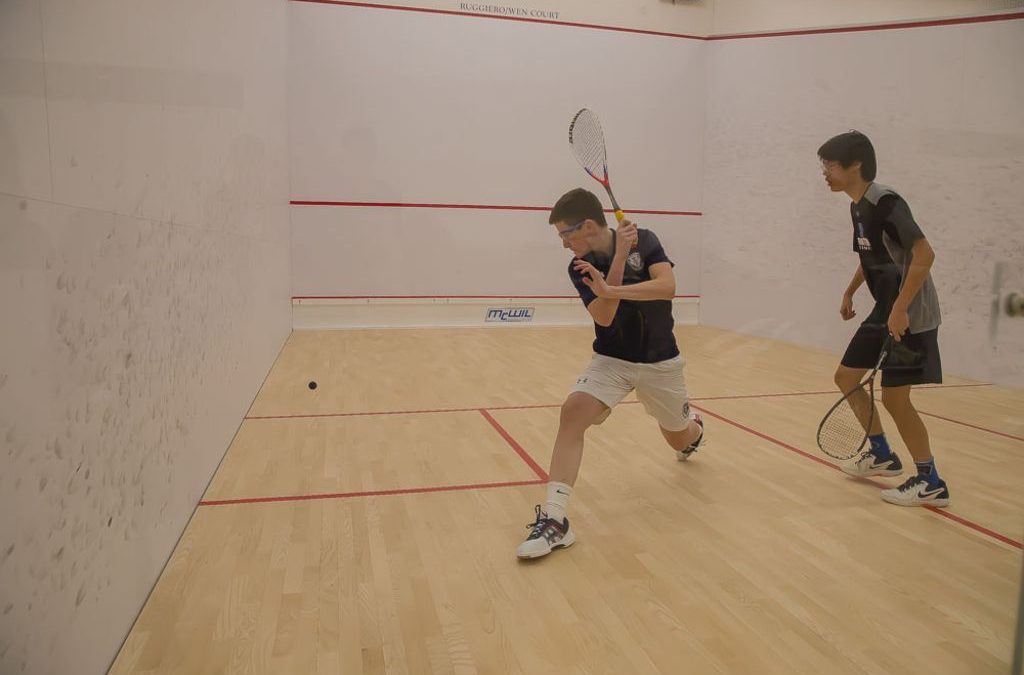
Mar 24, 2019 | Athletics
By Brian Li ’22
This year, the boys’ squash team had an excellent season and finished with a very strong record. The team also placed 17th at Nationals, becoming Division II National Champions in the process. Under the captainship of Jeffrey Xiao (VI) and Chris Zachary (VI), they went into every match with the determination to overcome all barriers and win.
Coached by Mr. Ramsay Vehslage, the team beat Lawrenceville 6-1, claiming the unofficial title of State Champions yet again. The team also performed exceptionally well at the High School National Championships in Hartford, Connecticut. Despite not qualifying for Division I this season, they put all their effort into the tournament and won Division II, beating some of the top schools in the country, including Choate Rosemary Hall and Phillips Andover. Mr. Vehslage commented, “The boys played with incredible heart all weekend … We’ve been working hard all season long, and it’s great to see the consistent effort paying off when it mattered the most.”
On January 6, the boys’ squash team competed in the New Jersey High School Squash Championship. The players had an impressive showing, with Chris Zachary placing second and Alex Chiang (V) finishing in third place.
Although seniors Xiao and Zachary are leaving this year, the team is looking forward to the arrival of new freshmen and hopes to continue competing at the highest level in the future.








